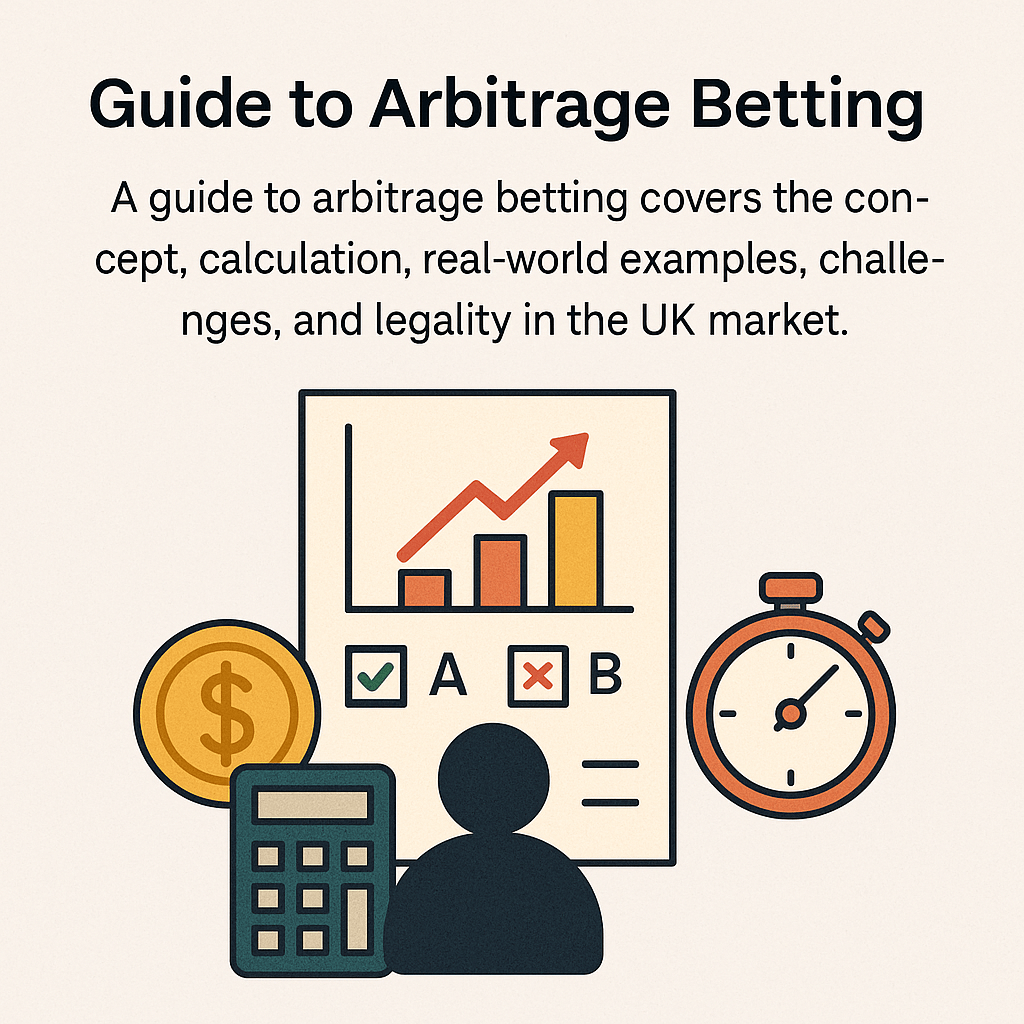Arbitrage Betting Guide: The Complete UK Bettor’s Handbook
This article breaks down how arbitrage betting works. From simple examples to advanced tips, this reveals how UK bettors can try to secure small, consistent profits.

Introduction: What Is Arbitrage Betting?
If you’ve ever dreamed of placing bets that can’t lose, you’ve probably stumbled across the term arbitrage betting. But what exactly is it, and does it truly offer risk-free profit?
In this arbitrage betting guide, we’ll explore everything from the basic concept to advanced calculations, practical pitfalls, and UK-specific considerations. Whether you’re a casual punter curious about new strategies or someone seriously considering an arbitrage venture, this guide will help you understand the realities of this unique betting method.
The Basic Concept: Arbitrage Explained
Arbitrage betting, often shortened to “arbing,” is a technique where you place bets on all possible outcomes of an event with different bookmakers or betting exchanges, securing a profit regardless of the result.
Why It Exists
Arbitrage opportunities arise because bookmakers sometimes:
- Disagree on odds (e.g. Bookmaker A thinks Team X has a 50% chance of winning, Bookmaker B thinks it’s only 40%).
- React differently to new information (team news, injuries, weather conditions).
- Adjust odds at different speeds.
This leads to price discrepancies large enough that, if you bet on all outcomes correctly, you lock in a guaranteed profit.
A Simple Example of Arbitrage
Let’s imagine a Premier League football match:
Man United vs. Chelsea
- Bookmaker A offers odds of 2.20 on Man United to win.
- Bookmaker B offers odds of 2.20 on Chelsea to win.
Because a football match can end in a draw, this example isn’t technically an arb unless you include the draw. So let’s simplify and use a tennis match, where there are only two outcomes:
Tennis Match – Player A vs. Player B
- Bookmaker A offers odds of 2.10 on Player A.
- Bookmaker B offers odds of 2.10 on Player B.
Let’s see how an arb might work.
- You calculate the implied probability for each player:
- Player A: 1 / 2.10 = 0.4762
- Player B: 1 / 2.10 = 0.4762
- Total = 0.4762 + 0.4762 = 0.9524
Since the total probability is under 1 (less than 100%), an arbitrage exists. That spare percentage (~4.76%) represents your margin.
- Decide how much to stake.
Say you want to invest £200 total:
- Stake on Player A = £200 × (0.4762 / 0.9524) ≈ £100
- Stake on Player B = £200 × (0.4762 / 0.9524) ≈ £100
No matter who wins:
- If Player A wins: £100 × 2.10 = £210 → Profit = £10
- If Player B wins: £100 × 2.10 = £210 → Profit = £10
So you’ve locked in a £10 profit, risk-free.
How to Calculate Arbitrage Bets
Understanding how to calculate arbitrage is essential. Let’s break it down step by step.
Step 1: Calculate Implied Probabilities
For each outcome:
Implied Probability = 1 / Decimal Odds
If the sum of all implied probabilities is less than 1, an arb exists.
Step 2: Calculate Stake Distribution
Work out how to split your total investment so your returns are equal regardless of the outcome.
For each selection:
Stake = (Total Stake × Implied Probability) / Total Probability
Alternatively, many use online arbitrage calculators, including tools offered by betting exchanges like Smarkets.
Real-World Example – Back and Lay Arbitrage
Arbitrage doesn’t only happen between two bookmakers. It’s also common to create an arb between:
- A traditional bookmaker (back bet)
- A betting exchange (lay bet)
Imagine you find the following:
- Back odds on Bookmaker A: 3.50 for West Ham to win.
- Lay odds on Smarkets: 3.30 for West Ham NOT to win.
If the lay odds are lower than the back odds (after accounting for exchange commission), there may be an arbitrage opportunity.
Calculating Lay Stakes
Let’s say you place £100 on West Ham at odds of 3.50.
Lay stake calculation:
Lay Stake = (Back Odds × Back Stake) / (Lay Odds)
Lay Stake = (3.50 × £100) / 3.30 ≈ £106.06
Check your profit:
- If West Ham wins:
- Win £250 profit from Bookmaker A
- Lose £250 on Smarkets (lay liability)
- Net profit = £0 (needs adjusting for commission)
- If West Ham loses:
- Lose £100 with Bookmaker A
- Win £106.06 from Smarkets
- Net profit ≈ £6.06 minus commission
Adjust for exchange commission, and you may still lock in a small profit.
To really make the best of Arbitrage betting, you need to understand perfectly how odds work. Hopefully, we created a simple guide to allow beginners to Understand How Odds Work.
How Big Are Arbitrage Profits?
Arbitrage margins are usually small:
- Typical profit margins: 1% – 5% of your stake
- Higher margins: Rare and usually quickly corrected
So, with a £200 stake:
- At 2% margin → profit = £4
- At 5% margin → profit = £10
Hence, arbitrage betting often requires significant turnover and a large bankroll to generate meaningful income.
Types of Arbitrage Betting
Let’s look at the different types of arbs punters pursue in the UK market.
1. Two-Way Arbitrage
- Occurs in events with two outcomes (e.g. tennis matches).
- Simpler to spot and calculate.
2. Three-Way Arbitrage
- Applies to events like football, which can end in home win, draw, or away win.
- More complex calculations, but opportunities exist.
3. Back-Lay Arbitrage
- Combines bookmaker bets with lay bets on an exchange.
- Popular with UK bettors using exchanges like Betfair or Smarkets.
4. Cross-Market Arbitrage
- Exploits related betting markets.
- Example: Backing a team to win a football match and laying the same team in a different market, like “Draw No Bet,” where odds have drifted.
Practical Challenges of Arbitrage Betting
Although arbitrage betting can theoretically guarantee profit, it’s not as easy as it sounds. Here’s why.
1. Gubbing and Account Restrictions
- Bookmakers don’t like arbers because they’re “sure-thing” bettors.
- Many arbers get their betting accounts limited or closed (known as being “gubbed”).
- Warning signs:
- Sudden stake limits
- Removal of promotions
- Requests for documentation
2. Market Movements
- Odds change quickly.
- By the time you’ve placed one bet, the odds on the other side might shift, killing the arb.
- Arbers use fast software to spot and bet on arbs quickly.
3. Human Error
- Miscalculating stakes can wipe out profits or even cause losses.
- Typos or placing bets on the wrong markets are common mistakes.
4. Exchange Commission
- Betting exchanges charge commissions (e.g. Smarkets takes 2%).
- This must be factored into your calculations.
5. Payment and Withdrawal Limits
- Moving large amounts of money in and out of bookmaker accounts can:
- Raise suspicions.
- Take time, locking up funds.
- Incur fees (especially if using e-wallets).
Tools Used by UK Arbers
Professional arbers rarely do the calculations manually. Instead, they use:
- Arbitrage software: e.g. OddsMonkey, RebelBetting, OddsPortal.
- Excel spreadsheets for custom calcs.
- Odds comparison sites to quickly spot differences.
- Betting exchanges like Betfair, Smarkets, Matchbook.
UK Gambling Law and Arbitrage Betting
Is arbitrage betting legal in the UK? Yes.
- The UK Gambling Commission does not outlaw arbitrage.
- You’re legally allowed to place bets wherever you want, provided the bookmaker is licensed.
- However, bookmakers reserve the right to limit or close your account for any reason, including arbitrage activity.
Practical Tips for Arbitrage Betting in the UK
If you’re considering giving arbitrage betting a go, here are practical tips:
- Start small. Don’t go all-in until you’re comfortable with calculations and processes.
- Spread your bets. Use multiple bookmakers to avoid suspicion.
- Keep a low profile. Don’t withdraw large sums immediately or bet odd stake sizes that scream “calculator.”
- Factor in commission. Always adjust calculations for exchange commissions.
- Act fast. Arbs vanish quickly, so speed is crucial.
- Maintain meticulous records. Keep track of every bet, every stake, and every profit.
Common Mistakes to Avoid
- Betting before checking maximum bet limits.
- Overlooking currency conversion fees for foreign bookmakers.
- Forgetting to account for commissions.
- Being too slow and ending up with unmatched bets on exchanges.
- Assuming arbitrage is “risk-free” without considering practical risks like errors and limits.
Case Study: Arbitrage on the Grand National
Let’s say the Grand National is approaching – a prime event for UK bettors.
- Bookmaker A: offers 21.00 (20/1) for a horse to win.
- Bookmaker B: offers 17.00 (16/1) for the same horse to lose (lay price).
If you can back at 21.00 and lay at 17.00 (after commission), there may be an arbitrage. However, volatility in ante-post markets can make such arbs risky.
Many arbers focus on race day markets where liquidity is higher and odds movements are less wild.
The Bottom Line
Arbitrage betting is one of the few strategies in the betting world offering theoretical risk-free profit. However, it’s not a magic money tree:
- Profits are small percentages.
- Speed, accuracy, and discretion are essential.
- Bookmakers watch arbers closely and restrict accounts.
If you’re committed to learning the ropes, arbitrage betting can be a fascinating venture. But be realistic – it’s hard work, and you’ll need patience and discipline.
Where to go next on our site
- Our Betting Glossary and betting terms explained for the UK
- Best betting sites in the UK – tested and verified reviews of the best bookmakers in the UK,
- Best free bets offers – clear analysis of self-tested welcome offers for new customers,
- Football betting guides – bookmakers reviews on football and soccer betting.
Safer‑gambling resources
- GAMSTOP self‑exclusion – register free to block online gambling accounts. (Gambling Commission)
- National Gambling Helpline (GamCare) – 0808 8020 133, 24/7. (GamCare)
- NHS: Help for problems with gambling – official support and clinic info. (nhs.uk)
- GambleAware – advice, tools and signposting to treatment. (GambleAware)
Compliance note on scope: This guide focuses on Great Britain under the Gambling Act 2005, regulated by the UK Gambling Commission. If you’re in Northern Ireland, check local arrangements before you bet.
This guide was created with AI assistance and reviewed by a human editor to ensure accuracy and clarity. It is intended for informational purposes only and does not encourage gambling.
Frequently Asked Questions About arbitrage betting
Is arbitrage betting completely risk-free?
Theoretically yes – but practically no. Mistakes, bookmaker restrictions, and odds changes can introduce risk.
Can you make a living from arbitrage betting in the UK?
Some people do, but it’s a full-time job requiring:
– Large bankrolls.
– Constant monitoring.
– Multiple bookmaker accounts.
– Willingness to deal with limits and closures.
Is arbitrage betting legal in the UK?
Yes. Arbitrage betting is legal, but bookmakers may restrict you.
Do bookmakers ban arbers?
They often restrict them rather than outright ban them. Your maximum stakes may be slashed to pennies.
How much money do you need to start?
You can start small (e.g. £200-£500), but profits scale with your bankroll.






